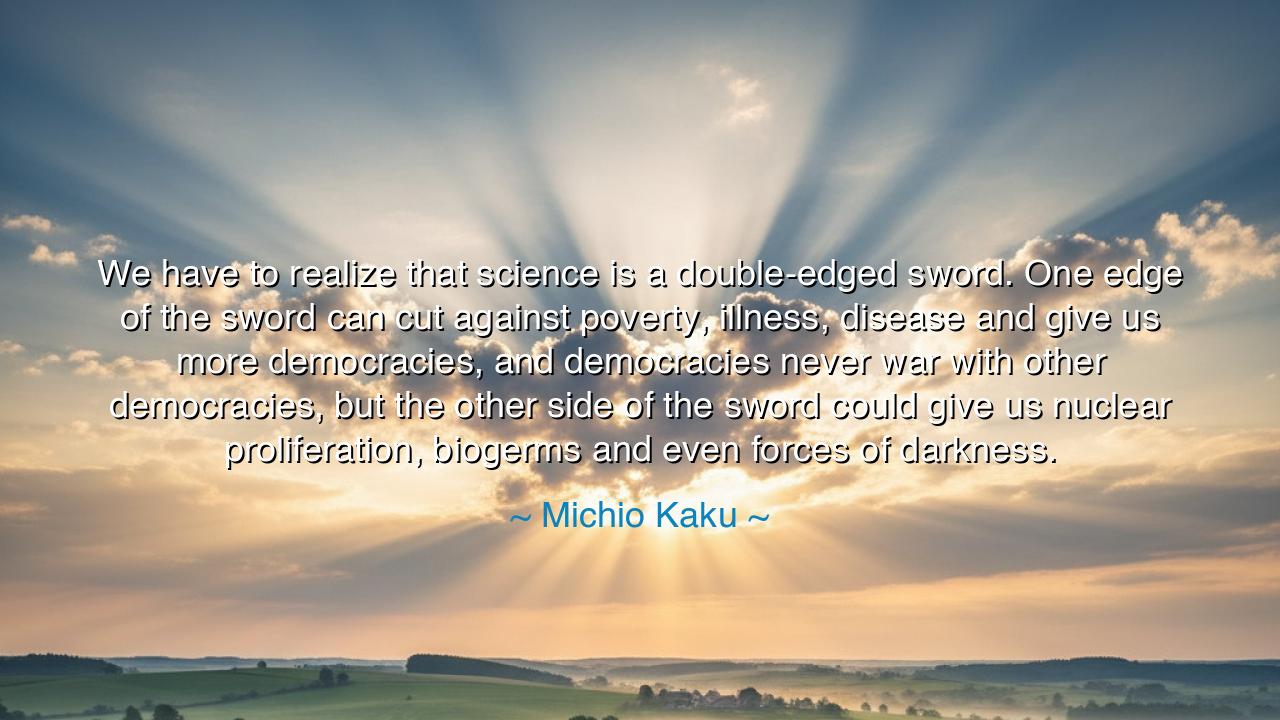
We have to realize that science is a double-edged sword. One edge
We have to realize that science is a double-edged sword. One edge of the sword can cut against poverty, illness, disease and give us more democracies, and democracies never war with other democracies, but the other side of the sword could give us nuclear proliferation, biogerms and even forces of darkness.






"We have to realize that science is a double-edged sword. One edge of the sword can cut against poverty, illness, disease and give us more democracies, and democracies never war with other democracies, but the other side of the sword could give us nuclear proliferation, biogerms and even forces of darkness." These words, spoken by Michio Kaku, carry a profound lesson for all who seek to wield the power of science. They remind us that science, in all its beauty and potential, is not a force of good or evil in itself—it is a tool, a mighty weapon, and how we choose to use it determines the future of humanity. It is a sword that can heal and harm, lift us to new heights or cast us into darkness. The truth contained within Kaku’s words is both powerful and sobering, urging us to recognize the responsibility we bear in the pursuit of knowledge and technological advancement.
In the ancient world, the philosophers and scholars understood that knowledge was a gift that could illuminate the mind, but it could also be a burden, a force that must be handled with great care. Plato, in his writings, warned of the dangers of power unchecked, acknowledging that knowledge and wisdom could either shape a just society or lead it to ruin. Even Prometheus, in Greek mythology, brought fire to humanity—a gift of immense power. Yet, the fire, though it could warm and light the world, could also burn. This duality of knowledge, this recognition that power can be both a force for good and evil, is as ancient as civilization itself. Kaku’s quote brings this wisdom forward, urging us to understand the dual nature of science.
Consider the discovery of penicillin in the 20th century—a breakthrough that revolutionized medicine, curing diseases that once ravaged humanity. Alexander Fleming’s accidental discovery of this miracle drug brought an end to countless deaths and suffering, alleviating the burdens of disease and extending lives across the globe. Penicillin, a tool of science, became a sword that cut against the suffering of illness. Yet, just as easily, we have seen how science has given rise to the dark side of its power. The same advancements that brought medical miracles have also contributed to the creation of antibiotic-resistant bacteria, a growing threat that humanity now faces. The edge of science that once saved lives is now, in some cases, threatening them, revealing how this double-edged sword must be handled with caution and wisdom.
In the realm of nuclear energy, we witness this same duality. The Manhattan Project, the culmination of scientific discovery during World War II, brought forth the creation of the atomic bomb, a weapon that ended the war but also introduced the world to the possibility of nuclear destruction. The potential for peaceful nuclear energy—a source of clean, boundless power—is also a product of this scientific advancement. Yet, with that same knowledge, the world was forced to confront the terrifying potential of nuclear proliferation, the spread of nuclear weapons that could bring about global catastrophe. The balance between progress and danger has never been more apparent. What began as a noble pursuit of knowledge has, in some ways, led to the darkest of human possibilities—reminding us that science does not simply solve problems but creates new challenges.
Biotechnology offers yet another example of science’s double-edged nature. On one hand, we have the potential to eradicate diseases, create life-saving treatments, and extend human life through genetic engineering. But on the other, the knowledge of biogerms and genetic manipulation has the potential to be weaponized. The creation of bioweapons, capable of wiping out populations, is a reality we must face. The same science that can feed the hungry and cure the sick is the same science that can destroy. This is the burden that humanity must bear—the power to create, and the power to destroy, resides in the same realm of knowledge.
Kaku’s warning is clear: science is neither inherently good nor inherently evil. It is the human spirit, the intention behind the pursuit of knowledge, that defines its path. It is up to us to ensure that the sword of science is wielded for the good of all. The lesson here is one of responsibility—a responsibility that each generation must take up. Just as the ancient philosophers cautioned their societies to balance wisdom with caution, we, too, must be vigilant in our use of science. It is not enough to seek knowledge for knowledge's sake; we must always ask: What will we do with this knowledge? Will we use it to heal and uplift, or will we use it to harm and destroy?
In our own lives, let us take this wisdom to heart. As we advance in science and technology, let us not forget that we are the stewards of this knowledge. We must ensure that the sword of progress cuts away the chains of poverty, disease, and ignorance, but that it does not also bring about our own downfall. Ethical choices, guided by wisdom, are the only path forward. It is through the careful and thoughtful application of knowledge that we can ensure the good of science—its ability to bring peace, prosperity, and progress to the world. May we choose to wield the sword with great care and foresight, for it is through our choices that the future will be shaped.






AAdministratorAdministrator
Welcome, honored guests. Please leave a comment, we will respond soon